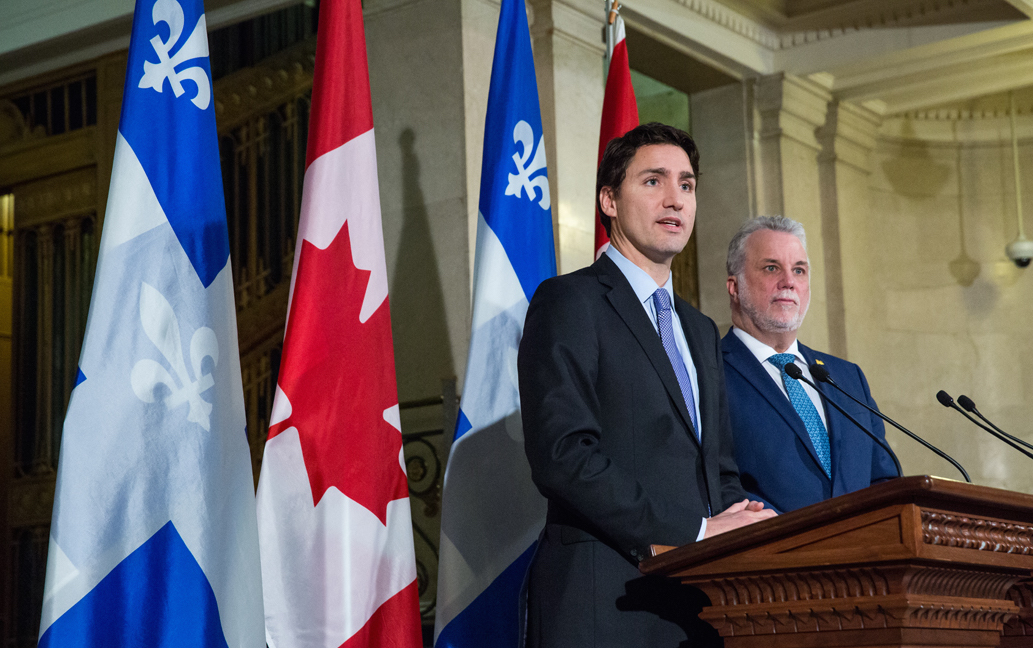In the 150th year of Confederation, Quebec Premier Philippe Couillard wants to talk about how Canada governs itself. Justin Trudeau put him off, saying he did not want to open the Canadian Constitution for debate.
As former premier of Ontario Bob Rae pointed out, the Canadian Constitution is a living document, and discussion of its workings cannot be closed down.
Trudeau himself has initiated changes to the way the Senate is appointed and how it operates. Real Senate reform would require constitutional changes, as Rae pointed out.
Couillard wants Quebec to engage with Canada, and lamented how much of his province has lived in a sort of internal exile from Canada. Being a Quebecer is “our way of being Canadian” is the message the Quebec Liberal government wants to communicate across Canada.
In releasing a 177-page discussion paper, Quebecers: Our Way of Being Canadian, on June 1, the Liberal premier suggested that opening up a dialogue on Canada should be of interest to all Canadians and their representatives, and particularly to Aboriginal Nations.
Yes, there is something for the Quebec government in this approach. Couillard is playing for political advantage at home.
The premier wants Quebec to divide politically, not over what to do about the economy, but along sovereignist versus federalist lines, leaving his Liberals on one side (with a fledging NDP in Quebec for company), and his main opponents, the PQ and the resurgent Coalition Avenir Québec (CAQ), on the other side (with Québec Solidaire (QS)).
The CAQ is emerging as a threat to the Quebec Liberals. CAQ leader and former PQ minister François Legault has an ambiguous position on Quebec and federalism that amounts to “let’s talk about this later” — once more important issues have been addressed.
The more important issues are right-wing economic ideas of the type being pursued by Couillard and his party.
Liberals fear the lagging economy makes the CAQ an alternative to the government in the provincial election slated for 2018.
Couillard wants the CAQ painted as an unacceptable sovereignist party to scare off Liberal voters unhappy with his government who might be tempted by Legault.
Meanwhile, the sovereignist PQ have taken sovereignty off the table for the next campaign, pledging instead to provide good government in its first mandate, before tackling sovereignty, presumably in the second mandate.
Couillard would like nothing better than to push the PQ into defending its sovereignty position in the run-up to the fixed date election next year.
The highly progressive QS occupy not only the left of the socio-economic terrain deserted by the PQ (and after Jean Charest took over the leadership, by the Liberals) but are also hunting sovereignist voters.
A poorly disguised effort by PQ leader Jean-François Lisée to draw the QS under a PQ-held umbrella of sovereignist parties did not tempt the QS.
Among the issues not addressed by the Canadian Constitution are economic and social rights. These were left out of the Canadian Charter, though they are included in the Universal Declaration of Human Rights (UDHR) adopted by the United Nations General Assembly in 1948.
As noted in the Canadian Encyclopedia, the Canadian government abstained at the committee stage in voting for the Universal Declaration (drafted by Canadian John Humphries), and only voted “yes” in plenary session to avoid being in the “no” camp with apartheid South Africa and the Soviet Union.
These UDHR rights, while not binding on governments, spell out undertakings no Canadian government has been willing to fulfill.
UDHR Articles 22-27 set out rights to “social security” through national efforts that a walk through downtown Canada today with homeless people at so many corners and doorways shows to be missing in this country.
Article 25 of the Universal Charter sets out an agenda worthy of Canadian aspirations today:
“[T]he right to a standard of living adequate for the health and well-being of himself [sic] and of his family, including food, clothing, housing and medical care and necessary social services, and the right to security in the event of unemployment, sickness, disability, widowhood, old age or other lack of livelihood in circumstances beyond his [sic] control.”
The government of Quebec wants to put change on the Canadian agenda. Their desire to partner with Indigenous peoples in creating a new agenda for debate should be welcomed.
The Trudeau government has been ducking the major challenges. How is Canada going to meet its Paris Climate Accord targets? What will the post-NAFTA Canadian economy look like? Why must Canadian women pay the price for austerity?
There is no good reason to allow the federal Liberals to defend the constitutional status quo. Debating what needs to be done to improve the well-being of Canadians with special reference to Aboriginal peoples should be warmly welcomed.
Duncan Cameron is former president of rabble.ca and writes a weekly column on politics and current affairs.





